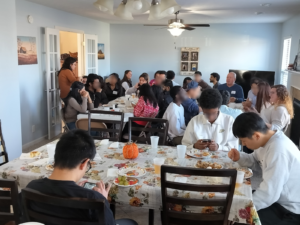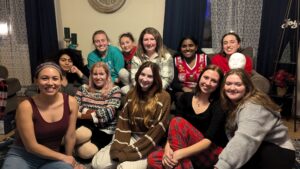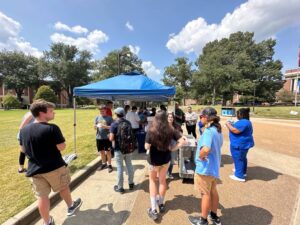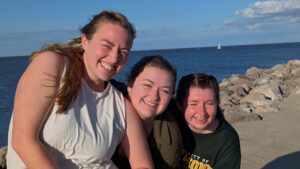Ministry Model Interview Questions
- What do you do to reach freshman? What do your fall outreach plans look like?
Because we are a metro ministry, meaning we serve more than one campus in our area, we have multiple “first weeks of school” where we are providing lots of opportunities to connect with them. A lot of our focus is on tabling on campus and providing a large event centered around free food where we can meet up with students, hear their stories, tell them ours, and make connections. We also attend as many freshmen events designed to help them engage in the university community. Because we serve in such a unique city (New Orleans) we use that to our advantage and take students on a French Quarter Scavenger Hunt that ends with dinner at a famous Cajun restaurant in town. - What do discipleship relationships look like in your ministry? What are the bare essentials for those relationships?
So we see discipleship on three levels. Level 1 would be our large group gathering and our weekly dinners. In those environments, we focus on building initial relationships with people. Outside outreach events done on campus are usually the two events that students check out first. Level 2 would be our Men’s and Women’s groups. These are usually led by interns to start and eventually taken over by students. The goal of these groups is to get students reading the Bible and understanding what they read. Level 3 is our Discipleship Groups or D-Groups. These are made up of 3-4 students of the same gender who study the Word together, pray for/with one another, and hold a high level of accountability with one another. The eventual goal is to multiply these groups by encouraging the members to find two people they can start a new group with by the end of the semester. - What is essential to your evangelistic strategy? What are you doing to train students to share the gospel?
The first gathering of each semester is a message on what the Gospel is and how to share it. From there we usually take students through how to share their stories, how to use methods like 3 Circles, Roman Road, etc. I encourage them to find a method that works for them and become as comfortable with it as possible. As a staff, we will also take students with us when we make Gospel Appointments in order to model what it should/could look like when they begin doing them. - What weekly programming do you have? If you could only do one of these events per week, what one would you do and why?
Programming is different on each campus and depending on if it is a heavy commuter campus or heavy residential. We split the city into two areas and replicate the 3 levels of discipleship on each side of town. The programs may have different names but they function the same. From there we do a lot of things on campus weekly to engage students. Those could be surveys, handing out drinks at a table, cooking large amounts of food and sponsoring a dorm and feeding all who come. We also try to connect students to a local church weekly. On two of our campuses, where getting to an evangelical church is tough to do, we host a monthly “Church on Campus” where we have partnered with a local church who comes to our campus and hosts a service either in our center or on the campus itself. We have seen new students come every time we host one. - Describe your large group meeting. What is the purpose of that meeting?
We usually have a game of some sorts to get people talking to one another. We then move into a time of prayer and musical worship. That is usually followed by someone preaching with an invitation on some weeks. Usually, after we have refreshments as students hang around after. - Describe the essentials to your small group Bible study structure.
Most of our groups are gender-specific with 1-2 co-ed. The main goal of all of them is getting students to read the Bible, interact with the text using a journaling method called H.E.A.R. journaling. We teach all of our students this method but really push it in the D-Group level. The co-ed studies are usually a Level 3 commitment for 6-7 weeks as we do the study. For example this semester I will be offering Masterlife Book 1 – The Disciple’s Cross. - What is your missions mobilizing strategy?
During the school year we focus on three initiatives: Love the Campus, Love the City, and Love the World. Loving the campus means sharing the Gospel, being a witness by how we conduct ourselves in class and at university events, and finding tangible ways to serve the college community. Loving the city means you have connected with a local church and are investing in the city through them. Loving the world means you are committing that before you graduate you will come with us on one of our mission trips outside of the US. As for summer, we have a great Summer Missions program in Louisiana called GOLA (short for Go Louisiana). It has four components to it. GOLA World is for students who can raise their funds to spend 8-10 weeks internationally with the IMB. GOLA VBS is made up of 20 students on 3 teams who go around the state for 6 weeks helping churches with low or no baptisms of kids do VBS. GOLA Apprentice pairs students with a call to ministry with churches looking for summer youth pastors, children’s ministers, etc. This is a 10-week program where the church agrees to pay them a specified salary and provide housing. GOLA Innovator pairs students with jobs where they can earn money and do ministry. All four of these receive full or partial funding from the money that students raise throughout the school year. - How do you organize your leadership team? What do you do to train your leaders and what are you expecting of them? What roles do your student leaders fill? What other outside volunteers and paid staff do you have?
Our students are organized based on their giftedness and passions. From there we take them through 4 areas of development that have a book they must-read for each one. These areas are Leadership, Theology, Apologetics, and Spiritual/Emotional Health. Right now the books we are using for each area are “The 21 Irrefutable Laws of Leadership” by John Maxwell, “The Reason for God” by Tim Keller, “Visual Theology” by Tim Challies, and “Emotionally Healthy Spirituality” by Peter Scazzero. So over a 2 year period, the leaders will have spent time in each area. After that two year period, we either move interested students into a student internship if interested or encourage them to focus on leading D-Groups. - How do you fund your ministry? What strategies and efforts are you using to grow your funding? What is one of your most successful fundraisers?
We are blessed that our local association of churches provides nearly 80% of our program funding. The rest comes from renting out our building in the summer to church groups needing lodging for mission trips and during the school year renting out the apartment in our building to students. We have a few individual donors who give annually or monthly. On top of that, I have raised money for special projects via social media posts. We don’t do any real fundraisers. - What hopes and expectations do you have of a person graduating from your ministry?
That they are a disciple who makes disciples, they love the local church and see themselves invested in one once they leave college, and they can sit down and explain the gospel with a child, teen, or adult.
About the Metro BMC
New Orleans Metro BCM covers students who attend eight different campuses across the New Orleans Metro area. Our goal is to intersect students with spiritual life change whether that is seeing them come to Christ or watching them grow in Christ. The ministry is led by Corey Olivier who has been in this role since December of 2016. He is married and has three teenage children and two very spoiled dogs. On top of leading BCM, Corey has served as the Chaplain for Tulane University’s Athletic Department where he serves as Chaplain for Football, Men’s Basketball, and Baseball. Each year he has anywhere from 5-8 students from New Orleans Baptist Theological Seminary who serve with him as interns learning how to practically do ministry while studying at the seminary. Corey can be followed on Twitter at @coreyolivier and Instagram at @coreyjolivier.






